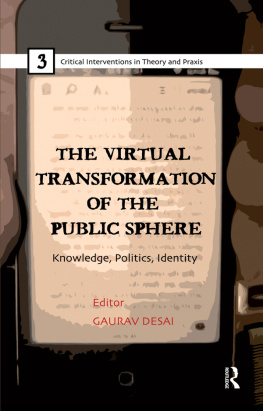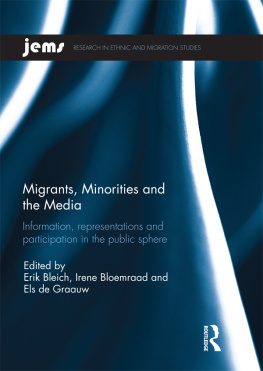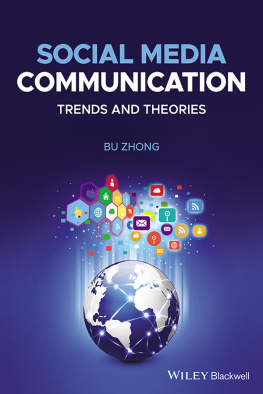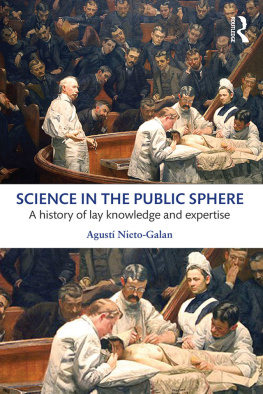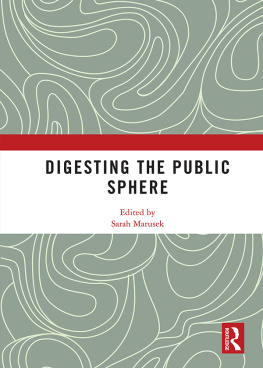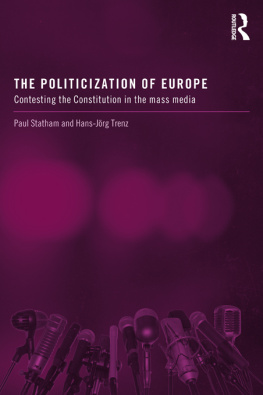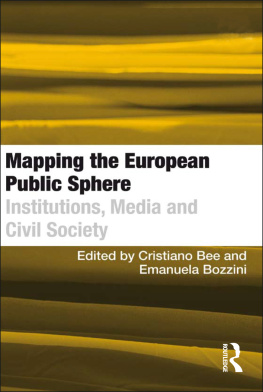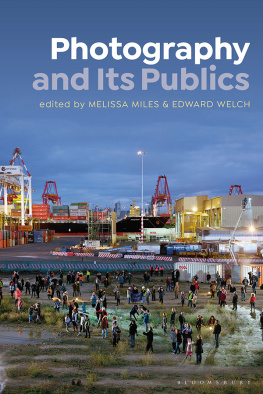The Virtual Transformation of the Public Sphere
critical interventions in theory and praxis
Series Editor: Prafulla C. Kar, Director, Centre for Contemporary Theory, Vadodara.
The volumes published in the Series will be devoted to current interventions in theory and its application. Issues addressed will engage with questions like the place of the human sciences in the age of technology; cultural studies and their implications for literature; the interface between science and philosophy; the teleology of Theory as a new topos; environmental and ethical issues in education; relations between globalized knowledge and indigenous sources of inquiry; identity debates in democracies and other forms of governance in both east and west; the role of media in relation to epistemies of violence; and reflections on the destiny of humankind. This, however, is not exhaustive, and the Series welcomes creative interventions on similar lines.
Also in this Series
Democratic Culture: Historical and Philosophical Essays
Editor: Akeel Bilgrami
978-0-415-58991-8
Reconsidering Social Identification: Race, Gender, Class and Caste
Editor: Abdul R. JanMohamed
978-0-415-68567-2
First published 2013 in India
by Routledge
912 Tolstoy House, 1517 Tolstoy Marg, Connaught Place, New Delhi 110 001
Simultaneously published in the UK
by Routledge
2 Park Square, Milton Park, Abingdon, Oxfordshire OX14 4RN
First issued in paperback 2015
Routledge is an imprint of the Taylor & Francis Group, an informa business
2013 Gaurav Desai
This volume is published in collaboration with the Forum on Contemporary Theory, Vadodara, and the Department of English and Cultural Studies, Panjab University, Chandigarh.
Typeset by
Bukprint India
B-180A, Guru Nanak Pura, Laxmi Nagar
Delhi 110 092
All rights reserved. No part of this book may be reproduced or utilized in any form or by any electronic, mechanical or other means, now known or hereafter invented, including photocopying and recording, or in any information storage and retrieval system without permission in writing from the publishers.
British Library Cataloguing-in-Publication Data
A catalogue record of this book is available from the British Library
ISBN 13: 978-1-138-66024-3 (pbk)
ISBN 13: 978-0-415-81171-2 (hbk)
CONTENTS
Introduction
The Virtual Transformation of the Public Sphere
G AURAV D ESAI
1. The Right to Look
N ICHOLAS M IRZOEFF
2. Democracy, the Public Sphere, and Problems of Self-reflexivity
R. R ADHAKRISHNAN
3. On the Market Colonization of the Virtual Public Sphere
L EWIS R. G ORDON
4. Cyberspace and Post-modern Democracy: A Critique of the Habermasian Notion of the Public Sphere
K. M. J OHNSON
5. Cybernecology: Liberation Aesthetics and the Public Sphere
T IMOTHY A LLEN J ACKSON
6. The Ever-expanding Sphere of Cybercommunities
S UKHDEEP G HUMAN
7. The Public Sphere: Restitution for the Internet
J AMES J. W INCHESTER
8. Piracy as Tactics: Re-imagining Creativity as Forms of Access
A RUNI M AHAPATRA
9. The Internet as a Public Sphere: The Emergence of New Forms of Politics in India
E SHA S EN M ADHAVAN
10. Virtual Activism, Real Repercussions: How Facebook Impacts the Public Sphere
H IBA A LEEM
11. Negotiating Virtual Terrain: New Social Media and the Public Intellectual
S UMEDHA I YER
12. Virtualization of the Politics of Recognition: Lepcha Struggle for Recognition as PTG in Darjeeling Hills (West Bengal) and Sikkim, India
P ADAM N EPAL
13. Identity and Virtual Spaces among the Zo hnahthlak: Emergent Zo Cyberpolitics
A NUP S HEKHAR C HAKRABORTY
14. The Public Spheres of Vicarious Fulfilments: Live Sex on the Internet and the Performative Dynamics of Body and Sexuality
B INI B. S.
15. Is the New Media Erasing Boundaries or Erecting Barriers? Gay/Transgender vs. Kothi/Aravani
S UNITA M ANIAN
16. Anonymity and Online Interaction: A Thematic (Dramaturgical) Perspective
M ALLIKA V IJAYA K UMAR AND P. E. T HOMAS
17. Constructing New Mediated Knowledge in the Process of Writing for Life
R ICH R ICE
18. Changed Dimensions of the Public Sphere: Medias Role in the Growth of Learning
P ANKAJ R OY
- Half Title
- 1. The Right to Look
- 2. Democracy, the Public Sphere, and Problems of Self-reflexivity
- 3. On the Market Colonization of the Virtual Public Sphere
- 4. Cyberspace and Post-modern Democracy: A Critique of the Habermasian Notion of the Public Sphere
- 5. Cybernecology: Liberation Aesthetics and the Public Sphere
- 6. The Ever-expanding Sphere of Cybercommunities
- 7. The Public Sphere: Restitution for the Internet
- 8. Piracy as Tactics: Re-imagining Creativity as Forms of Access
- 9. The Internet as a Public Sphere: The Emergence of New Forms of Politics in India
- 10. Virtual Activism, Real Repercussions: How Facebook Impacts the Public Sphere
- 11. Negotiating Virtual Terrain: New Social Media and the Public Intellectual
- 12. Virtualization of the Politics of Recognition: Lepcha Struggle for Recognition as PTG in Darjeeling Hills (West Bengal) and Sikkim, India
- 13. Identity and Virtual Spaces among the Zo hnahthlak: Emergent Zo Cyberpolitics
- 14. The Public Spheres of Vicarious Fulfilments: Live Sex on the Internet and the Performative Dynamics of Body and Sexuality
- 15. Is the New Media Erasing Boundaries or Erecting Barriers? Gay/Transgender vs. Kothi/Aravani
- 16. Anonymity and Online Interaction: A Thematic (Dramaturgical) Perspective
- 17. Constructing New Mediated Knowledge in the Process of Writing for Life
- 18. Changed Dimensions of the Public Sphere: Medias Role in the Growth of Learning
I would like to thank the local organizing committee and especially Professor Rana Nayar, Head of the Department of English, Panjab University, for hosting the conference on The Virtual Transformation of the Public Sphere in Chandigarh in December 2010. Thanks are also due to all the staff and friends of the Forum on Contemporary Theory in Baroda and our visionary leader, Professor Prafulla Kar, for his unfailing support and camaraderie over the years. The professionalism of the entire editorial team at Routledge, New Delhi, is most appreciated. My presence at the conference has been enabled by the International Travel Fund of the Graduate Schools Committee for Research at Tulane University. I remain grateful to my colleagues at Tulane for their many years of support.
GAURAV DESAI
Ever since the 1989 publication of Jrgen Habermass The Structural Transformation of the Public Sphere in English,
In December 2010, in Chandigarh, India, an interdisciplinary group of scholars gathered to re-examine the contours of this debate in the light of the significant transformations in digital technology and human communication that have taken place over the last few decades. This book is the result of some of those deliberations.
Organized under the auspices of the Forum on Contemporary Theory, the international conference was attended by scholars with different degrees of expertise and experience in both digital technologies and media theory. They came together not as what are colloquially (and fondly) termed techno-geeks, but rather as both producers and consumers of the mediated environments of which they spoke. Readers who want technically detailed discussions of digital coding and machinehuman interfacing will not find much of interest in this book. Those who are interested instead in how a variety of scholars be they literary critics, philosophers, media theorists, political scientists, anthropologists, or theorists of gender and sexuality have begun to engage with the new media will find much to reflect on. And as is the case with almost all scholarship on digital environments in our rapidly evolving world, the half-life of any claim or analysis will be found to be very short indeed.

